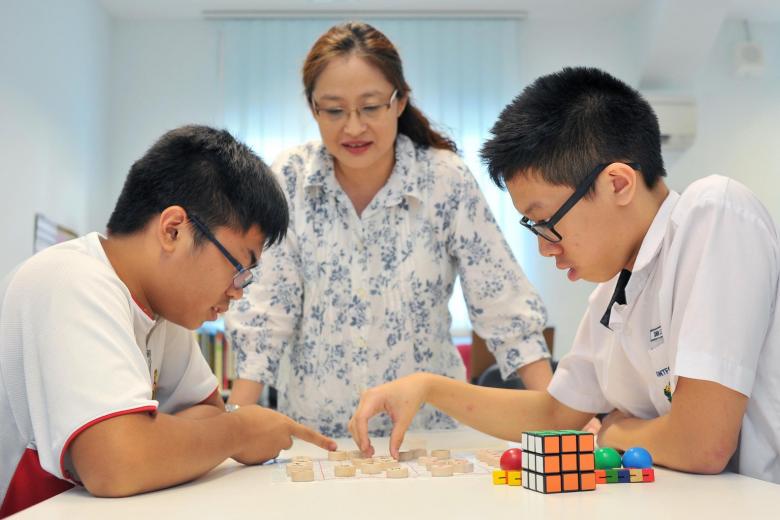SINGAPORE - Allied educators (AEDs) who help students with learning difficulties will have more avenues for career growth in the coming years.
In recognition of their growing importance, the Ministry of Education (MOE) said on Thursday (Oct 22) that a greater number of higher-level positions will be created for allied educators providing learning and behavioural support (LBS).
These are non-teaching staff who work with students in mainstream schools who have mild special needs such as dyslexia, autism and attention deficit hyperactivity disorder.
In a statement, the MOE said that allied educators providing learning and behavioural support will have their own development track when the allied educator scheme is split into distinct tracks in 2022.
A spokesman said this will "allow MOE to review the scheme tracks and its features distinctively to better meet the needs and career aspirations of each unique AED group".
"This serves to better recognise the unique professional expertise and diversity in specialisation for each individual AED staff group and build a sense of identity within their own scheme track," she said.
The MOE also wants to attract and retain more allied educators.
There are currently about 2,000 allied educators, with 600 specialising in learning and behavioural support.
Each primary school here has two allied educators specialising in learning and behavioural support, and most secondary schools have one such allied educator.
The total number of such staff has increased by more than 40 per cent over the last five years, to cater to the growing behavioural needs of students.
Other kinds of allied educators include school counsellors, outdoor adventure educators and student welfare officers.
The MOE is also creating more higher-level jobs based in its headquarters in the years ahead, starting from January next year with two new lead allied educators specialising in learning and behavioural support.
There will also be more positions like master and principal AEDs (LBS) for staff to aim for, where they can develop domain expertise and strengthen professional leadership in special need support.
In the long term, the fraternity will be led by several principal AEDs (LBS) with expertise across different areas, such as the needs of younger students or adolescents, or specific needs such as attention deficit hyperactivity disorder.
Allied educators specialising in learning and behavioural support will also have more opportunities for rotation stints at MOE headquarters, and there are plans for more training support.
Financial support will be provided to allied educators who wish to pursue programmes to deepen their knowledge and skills.
Ms Maria Lourdes and Mr Muhammad Suhairi Subarjo are the first two educators to be appointed as lead AEDs (LBS).
It will take effect in January.
Ms Lourdes, who is currently a senior AED (LBS) based in MOE's special educational needs division, said: "It's good that MOE is recognising the scheme, as people will also look up to us professionally.
"It's been 15 years since the scheme started, and there are new challenges and a new profile of students coming in."
Said the 40-year-old, who started as an AED (LBS) in Jurongville Secondary School, from 2008 to 2017: "We want to do more in the coming years, like focusing more on older students and preparing them for jobs, as well as mentor and coach AEDs.
"In the past, kids usually come in without much support, but now they have some knowledge of basic intervention, so we focus on social skills needed as teenagers."
She added that students with behavioural needs also need support in social media use.
Mr Suhairi, 40, who is also a senior AED (LBS) in MOE's special educational needs division, said having more opportunities for growth will also help to retain educators in the long run.
He was an AED (LBS) in Tampines Secondary School from 2005 to 2017, before moving to the ministry headquarters at the end of 2017.
Said Mr Suhairi: "Having rotations and seeing other schools will be helpful. Sometimes being in one school for so long, your perspectives might be biased.
"There are more things to learn when you move around."


